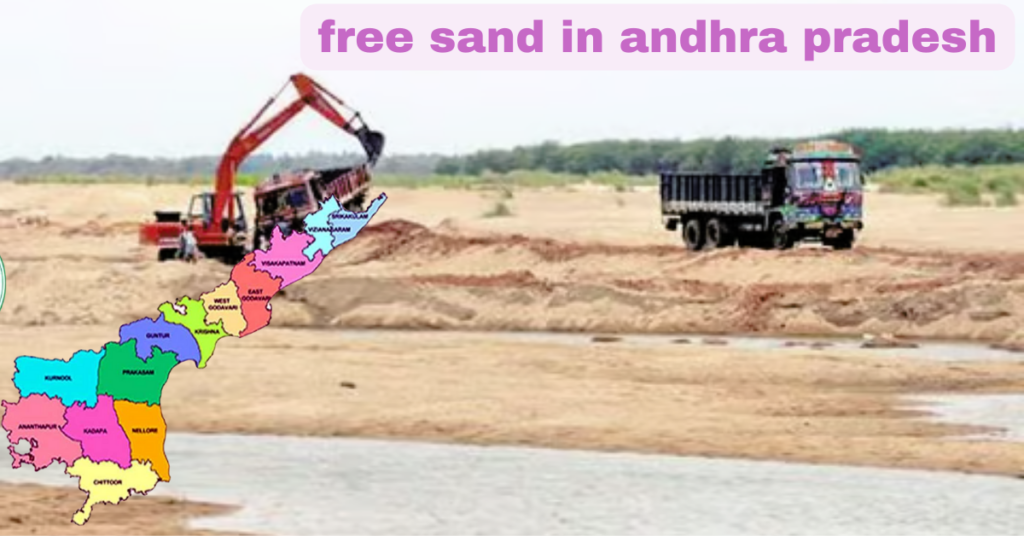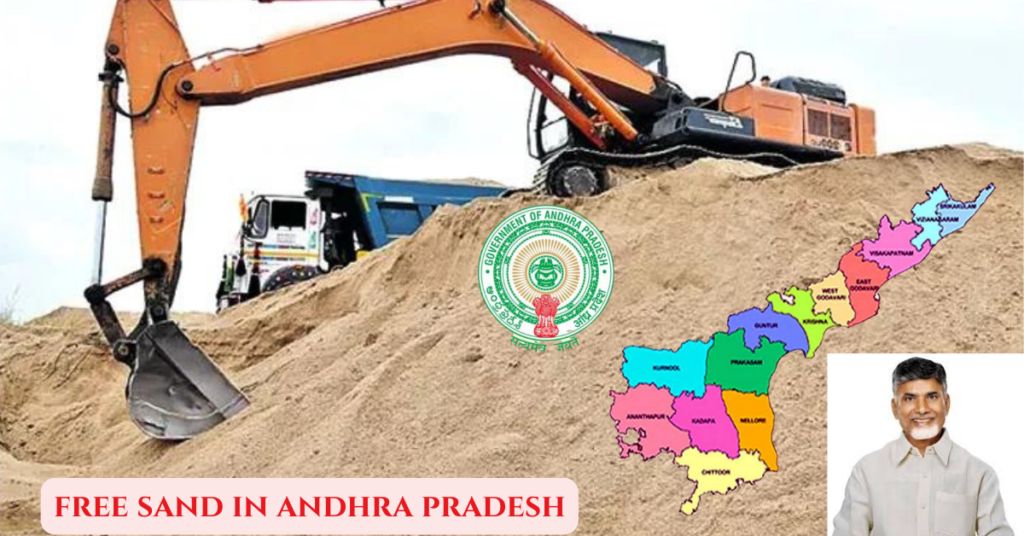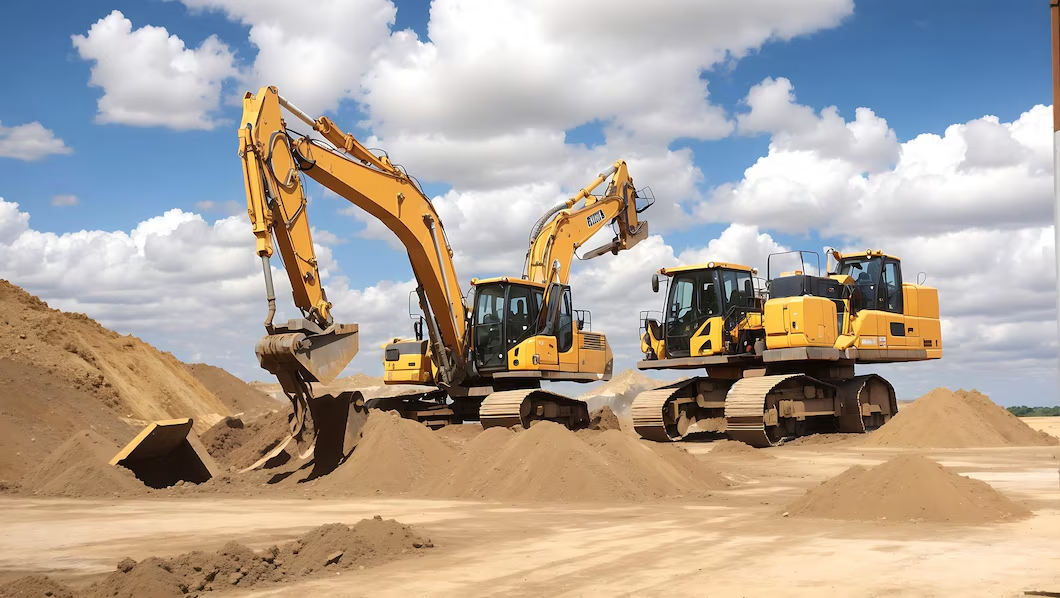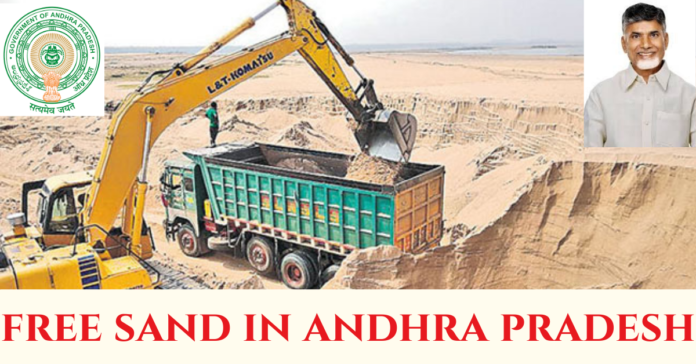Introduction:
The Government of Andhra Pradesh has recently announced a significant overhaul of its sand mining policies, withdrawing both the New Sand Mining Policy 2019 and the Upgraded Sand Policy 2021. An Interim Mechanism has been established to ensure a seamless supply of sand to consumers without generating any revenue for the government until the formulation of a Free sand in Andhra Pradesh Mining Policy in 2024.
Background and Rationale for Policy Change
The New Sand Mining Policy 2019 was introduced to regulate sand mining activities in Andhra Pradesh and was later upgraded in 2021 to address emerging challenges and improve operational efficiency. However, a comprehensive review revealed several areas needing improvement to better serve the interests of consumers and address environmental concerns.

Interim Mechanism for Sand Supply
In response to identified gaps, the Commissioner and Director of Mines & Geology, Andhra Pradesh, submitted a proposal detailing an interim mechanism to manage sand supply until the new policy is formulated. The administration has made the decision to put this temporary system in place, guaranteeing that consumers would receive sand at cost, with no more revenue share going to the state.
Key Objectives of the Interim Mechanism
- Affordably Accessible Sand: Ensuring that consumers may obtain sand at reasonable prices to facilitate construction endeavors throughout the state.
- Transparency in Operations: Enhancing transparency in sand mining and supply operations to prevent illegal activities.
- Respecting court judgments and environmental standards in order to lessen the negative effects of sand excavation on the environment.
The District Level Sand Committee’s Organization and Purpose (DLSC)
The management of sand activities at the district level is mostly the responsibility of the District Level Sand Committee (DLSC). The committee comprises various officials, including the District Collector (Chairman), Superintendent of Police, Joint Collector, and other relevant officers who are responsible for managing the sand store, supervising de-siltation operations, and guaranteeing adherence to legal and regulatory standards.
Management of Existing Sand Stocks
Sand stocks from private depots must be taken over by the DLSC, which is also in charge of making sure they are managed and disposed of securely. . This step aims to streamline Free sand in Andhra Pradeshavailability and prevent unauthorized transactions.
De-siltation of Reservoirs and Tanks
For the purpose of increasing water storage capacity and groundwater recharge, the interim mechanism places a strong emphasis on de-siltation of major, medium, and minor reservoirs and tanks. The Water Resources Department (WRD) will prepare feasibility reports and environmental management plans for these activities, ensuring all necessary clearances are obtained.
Implementation of De-siltation Activities
The WRD will carry out de-siltation operations in accordance with court orders and environmental rules in partnership with the DLSC. For this reason, contractors and agencies will be hired, and the DLSC will oversee the management of the de-silted material for eventual disposal.
Appointment of Manpower and Agencies
To ensure efficient operations, the DLSC Chairman will appoint stockyard in-charges and other necessary manpower for activities such as excavation, loading, and security. The purpose of these appointments is to keep everything running smoothly and to strictly adhere to the Free Sand in Andhra Pradesh policy and any applicable regulations.
Also Read: Bhogapuram Airport: A Game Changer for Economic Growth in Andhra Pradesh 2024

Fixation of Sand Rates
The government will not receive a revenue share under the temporary method. Rather, consumers will only be responsible for operational expenses, such as taxes and regulatory charges. The charges will be decided upon and communicated by the DLSC at each source; adjustments will be made in response to changes in regulations and operational expenses.
Sales and Dispatch Procedures
The DMG website will provide information about sand depots and de-siltation sites, including available amounts and fees, in order to improve transparency. Customers can buy sand straight from these establishments, and every transaction is digitally documented. Initially, the dispatch permits will be provided manually, and by 8 PM every day, the daily dispatch data will be uploaded online.
Transportation Arrangements
From the stockyards to their destinations, customers will organize their own transportation for sand. The DMG website will provide a list of transporters working at different areas to help with this.
Mining Policy, set to be formulated in 2024, will build on these foundations to ensure the long-term success and sustainability of Free sand in Andhra Pradesh
Objectives
- putting sand at a reasonable price for customers
- Ensuring transparency and visibility in sand operations
- Preventing illegal sand excavation and transportation through an effective vigilance and monitoring mechanism
- Complying with all environmental regulations and orders issued by the Supreme Court, High Court, and NGT to mitigate the environmental impact of sand excavation.
Salient Features
District Level Sand Committee (DLSC):
| Position | Role |
|---|---|
| District Collector | Chairman |
| Superintendent of Police | Member |
| Joint Collector | Member |
| Sub-Collector/RDO Concerned | Member |
| District Enforcement Officer (SEB) | Member |
| District Mines & Geology Officer concerned | Member Convener |
| District Panchayat Officer | Member |
| Regional Transport Officer | Member |
| Deputy Director, Ground Water Department | Member |
| Executive Engineer, Irrigation/River Conservation | Member |
| Executive Engineer, Rural Water Supply | Member |
| Environmental Engineer, Andhra Pradesh State Pollution Control Board | Member |
| Any other invitees as suggested by the Chairman | Member |
Sand Stocks Available in Existing Depots:
The DLSC will immediately take over the sand stocks available in depots maintained by private agencies, ensuring their secure management and disposal.
De-siltation of Reservoirs/Tank Beds:
The de-siltation of major, medium, and minor reservoirs and tanks will be undertaken to enhance storage capacity and groundwater recharge. The Water Resources Department (WRD) will prepare feasibility reports and obtain necessary clearances.
Implementation of De-siltation Activities:
The WRD, in collaboration with the DLSC, will undertake de-siltation activities, appointing contractors and agencies as needed and ensuring compliance with environmental regulations and court directives.
Appointment of Manpower and Agencies:
The DLSC Chairman will appoint necessary manpower for stockyard management and other activities, ensuring smooth functioning and compliance with regulatory requirements.
Fixation of Sand Rates:
There will be no revenue share for the government. Consumers will bear the cost of operations, including statutory levies and taxes, with rates determined and notified by the DLSC.
Sales and Dispatch:
Details of sand depots and de-siltation points will be displayed on the DMG website, with all transactions recorded digitally. Sand can be bought by customers straight from these establishments.
Transportation:
Consumers will arrange their own transportation for sand, with a list of transporters provided on the DMG website. Penalties will be enforced for any violations related to sand transportation and extraction.
Penalties and Seizure Procedures for Illegal Sand Mining Activities
If sand is found to be stocked, hoarded, black marketed, or sold beyond a person’s reasonable requirement, it will be seized by an authorized officer. The person responsible will face imprisonment for up to 2 years and a fine of Rs. 2,00,000/- (Rupees Two Lakhs). The District Level Sand Committee (DLSC) will take over the seized sand and arrange for its disposal at rates fixed by the DLSC.
Authorized Officers for Levying Penalties and Seizing Vehicles
the officers authorized to levy and collect penalties and to seize vehicles involved in illegal sand mining activities:
| S.No | Authorized Officer |
|---|---|
| 1 | District Collector (Concerned) |
| 2 | Joint Collector (Concerned) |
| 3 | Superintendent of Police (Concerned) |
| 4 | Additional Superintendent of Police/OSD (Concerned) |
| 5 | Sub-Collector/Revenue Divisional Officer (Concerned) |
| 6 | Tahsildar (Concerned Mandal) |
| 7 | Sub-Divisional Police Officer (Concerned) |
| 8 | Station House Officer (Concerned) |
| 9 | District/Divisional Panchayat Officer (Concerned) |
| 10 | District Mines & Geology Officer (Concerned) |
| 11 | Any other officer nominated by the District Collector (Concerned) / Director of Mines & Geology |
| 12 | SHO (Special Enforcement Bureau), concerned |
| 13 | Additional Superintendent of Police (Special Enforcement Bureau), concerned |
| 14 | Enforcement Superintendent, Enforcement Bureau, concerned |
Also Read: Market Value of land in AP: Market Trends, Insights and How to check…
Procedure for Seizure of Vehicles/Machinery
If a vehicle or machinery is found involved in violations more than twice, it, along with the sand, will be seized by authorized officers following this procedure:
Show Cause Notice:
Give a “show cause” notification to the owners or individuals from whom the equipment or car has been taken.
Seizure Report and Court Submission:
Prepare a seizure report and produce the vehicle/machinery before the Competent Court to enable the person/owner to file an application under Section 451 of the Criminal Procedure Code (Cr.P.C), Section 497 of the newly enacted Bharatiya Nagarik Surakshit Sanhita, 2023, or the appropriate section of law for the release of the vehicle/machinery.

Explanation and Application for Release:
The person/owner may submit an explanation to the show cause notice along with an application to the authorized officer seeking the release of the vehicle/machinery.
Consideration and Orders:
Upon receiving the explanation and application, the authorized officer will consider the application and pass appropriate orders within two weeks. The release will be subject to the production of security as follows:
Rs. 25,000/- for a tractor
Rs. 1,00,000/- for vehicles up to 10 tonnes capacity
Rs. 1,50,000/- for vehicles above 10 tonnes capacity
Rs. 2,00,000/- for any machinery The security should be in the form of a Demand Draft drawn in favor of the authorized officer along with an affidavit/undertaking to produce the seized vehicle/machinery as and when required.
Deposit of Fines and Security:
The fine paid as per the orders of the Competent Court and the security furnished will be deposited in the head of account “0853-102-81-other receipts”. The original challan will be sent to the Director of Mines & Geology concerned.
Also Read: Mega Projects in Andhra Pradesh 2024: Shaping the State’s Future
Conclusion:
The recent overhaul of Andhra Pradesh’s sand mining policies marks a decisive step towards ensuring transparency, affordability, and environmental compliance in sand mining operations. The introduction of an interim mechanism aims to streamline sand supply without generating government revenue, focusing on consumer interest and sustainability. With the formulation of a new Sand Mining Policy set for 2024, the state is committed to addressing the challenges and improving the management of sand resources to support construction activities and environmental preservation.
Frequently Asked Questions :
The overhaul was prompted by a comprehensive review of the New Sand Mining Policy 2019 and the Upgraded Sand Policy 2021, which revealed several areas needing improvement to better serve consumers and address environmental concerns.
The interim mechanism ensures a seamless supply of sand to consumers at cost, without generating any revenue for the government, until the new Sand Mining Policy is formulated in 2024.
The District Level Sand Committee (DLSC), comprising various officials including the District Collector, Superintendent of Police, and Joint Collector, oversees sand operations at the district level.
The interim mechanism enhances transparency by displaying details of sand depots and de-siltation points on the DMG website, ensuring all transactions are digitally recorded and monitored.
Suggested Articles:
Mega Projects in Andhra Pradesh 2024: Shaping the State’s Future
Market Value of land in AP: Market Trends, Insights and How to check…
Bhogapuram Airport: A Game Changer for Economic Growth in Andhra Pradesh 2024



